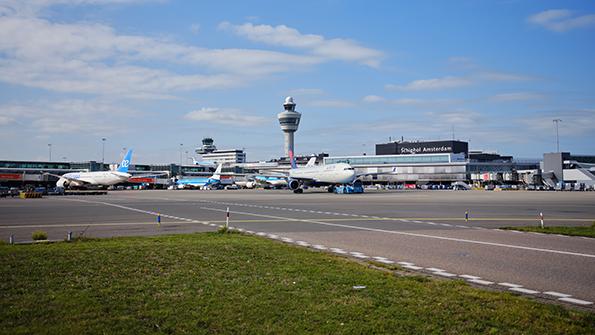
Fewer slots will be available at Schiphol, one of Europe’s busiest airports.
Airlines operating out of Amsterdam Airport Schiphol are going to have to cope with about 4% fewer slots available next summer—unwelcome news for their short-term planning that also highlights the longer-term effect operational restrictions can have on their business models.
The slot reduction comes as the Dutch government seeks to move ahead with its controversial plan to reduce noise at Schiphol by limiting flight capacity.
- Approximately 4% fewer Schiphol slots will be available in the summer of 2024
- IATA says slot reduction confirms airlines’ worst fears
- European Commission is looking into the Schiphol situation
Conrad Clifford, deputy director general of the International Air Transport Association (IATA), said in a statement the news that fewer slots would be available next summer “confirms our worst fears of the effects of the enforced cut to flight numbers at the airport.
“This is where the government’s ill-thought-out plans hit reality: fewer destinations, and less choice, resulting in fewer travelers, lost employment and reduced investment coming into the Netherlands,” he added.
KLM Royal Dutch Airlines, whose hub is at the airport, has previously warned that any move to limit flight numbers at Schiphol would harm its network, which counts close to 170 direct destinations from Schiphol.
The plan the Netherlands has submitted to the European Commission foresees a reduction in operations at Schiphol to 460,000 movements as of March 2024, down from 500,000, through an “experimental regulation.”
Last year, the Netherlands set out plans to limit capacity at Schiphol in a bid to reduce noise from the airport. Unsurprisingly, airlines objected and grouped together to launch a legal challenge. And in the case of KLM, the airline presented its own plan to reduce noise without resorting to capacity cuts.
Royal Schiphol Group, the airport’s operator, added its voice to the mix when it set out its own plan to reduce noise, including controversial steps such as banning private jets and introducing a night curfew.
While a Dutch court agreed with airlines earlier this year that the plans were unlawful, the government appealed, eventually winning its case with a higher court ruling the plans could go ahead.
Airlines are now awaiting the hearing of a further appeal, and the European Commission is carrying out an in-depth assessment of the compatibility of the Dutch measures with EU laws.
“While the Commission fully supports the intention to tackle important environmental and noise concerns, such measures must be applied in accordance with relevant EU law,” a spokesperson says.
The law in question is the balanced approach procedure, which member states must follow when seeking to reduce noise at an airport. The law sets out steps to take before resorting to operational restrictions.
“Meanwhile, our appeal to the cassation court remains to be heard,” Clifford said. “We hope the court decides swiftly on the legality of the ‘experimental regulation’ that is causing this mess,” he added, referring to the plan to limit flights to 460,000 from March.
Whatever the outcome of that legal case and European investigation, ACNL—the Netherlands’ slot coordinator—has confirmed fewer slots will be available for airlines operating out of Schiphol in the summer of 2024.
“According to the draft capacity declaration of Amsterdam Airport Schiphol, the seasonal limit for Northern Summer 2024 will be set on 280,645 slots,” an ACNL spokesperson told Aviation Week.
That represents a reduction of approximately 4% compared with last summer—although ACNL noted that the summer 2024 period lasts one week less than the summer of 2023.
Airlines must submit their initial requests by Oct. 5, and ACNL will publish initial allocation results for the summer of 2024 on Nov. 2, it said, at which point it will be clearer which routes are affected by the reduction. “ACNL applies in initial allocation the principle of proportionality. All airlines will be affected in the same order,” the ACNL said.
This news comes as aviation and its effect on the environment are in the spotlight for another reason. The European Parliament recently voted to adopt the ReFuelEU legislation, setting out sustainable aviation fuel (SAF) mandates in a bid to encourage production of the alternative fuels that are seen as the most realistic short-term way to decarbonize aviation.
While airlines have welcomed the adoption of ReFuelEU, the Schiphol situation highlights the reality. Alongside legislation they see as supporting their own efforts to decarbonize—many airlines are already targeting proportions of SAF that go far beyond the requirements—they are also likely to face environmental and noise restrictions that will hurt their short-term operations.
IATA’s Clifford said developments at Schiphol could not be allowed to be “helaas, pindakaas,” a colloquial Dutch expression meaning “too bad,” as he urged the European Commission to act. “This is surely the wake-up call other governments need to remind the Dutch of their responsibilities under international law and bilateral air service agreements.
“Too much is at stake,” he added. “Jobs today and the prosperity of the Netherlands in the future will be damaged by this decision. This caretaker Dutch government, lacking any democratic mandate, is setting fire to its own shop.”
KLM Royal Dutch Airlines CEO Marjan Rintel used the same analogy Sept. 1 when she spoke out about the planned flight cap. “As an outgoing minister, you don’t mind the shop by closing it!” she said, referring to Mark Harbers, infrastructure and water management minister, who first presented the plan.
Rintel said the airline’s own plan to reduce noise and emissions and boost efficiency showed that it could achieve the noise reduction targets while maintaining the current number of flight movements, maintaining the connection between the Netherlands as a trading nation and the rest of the world.
